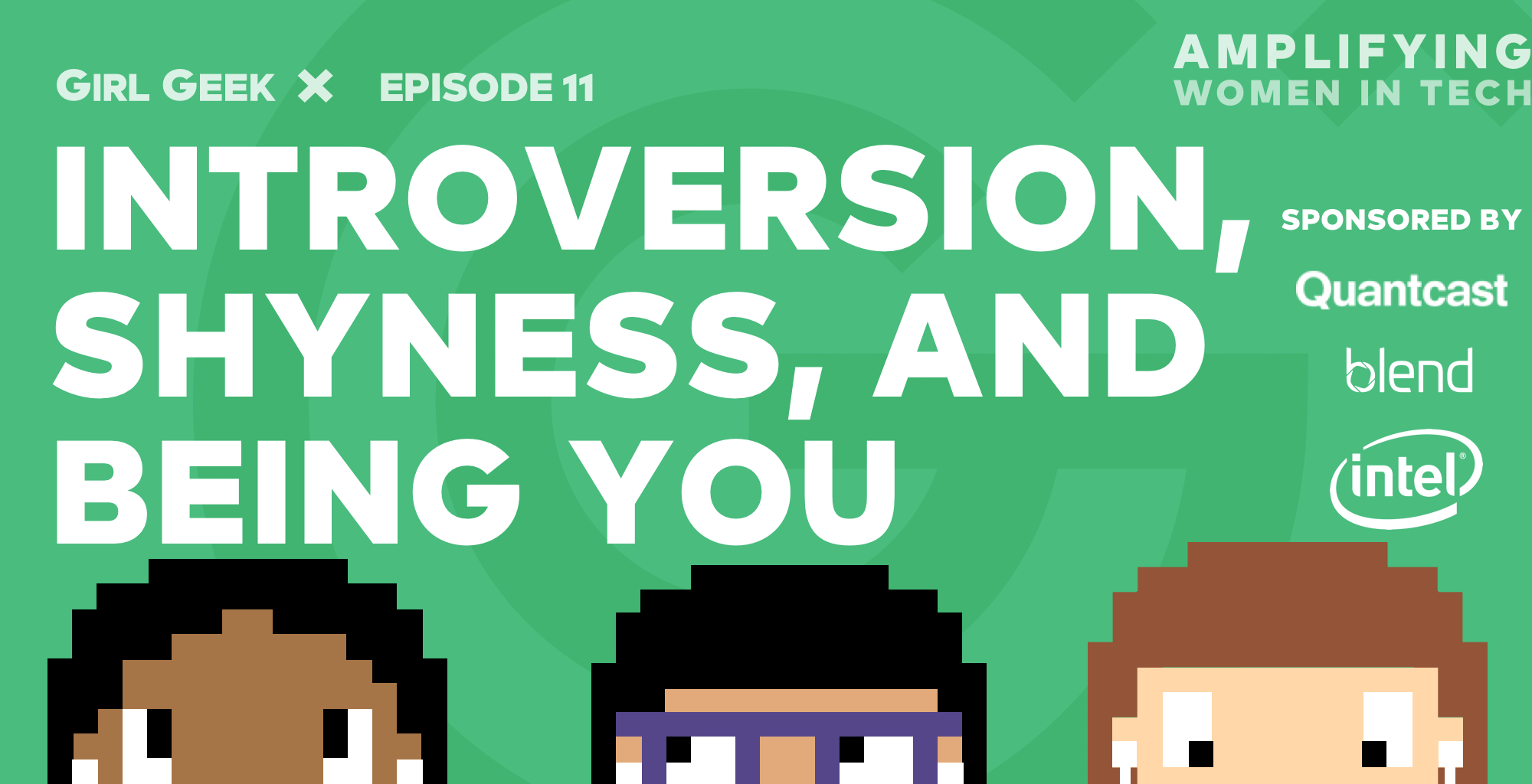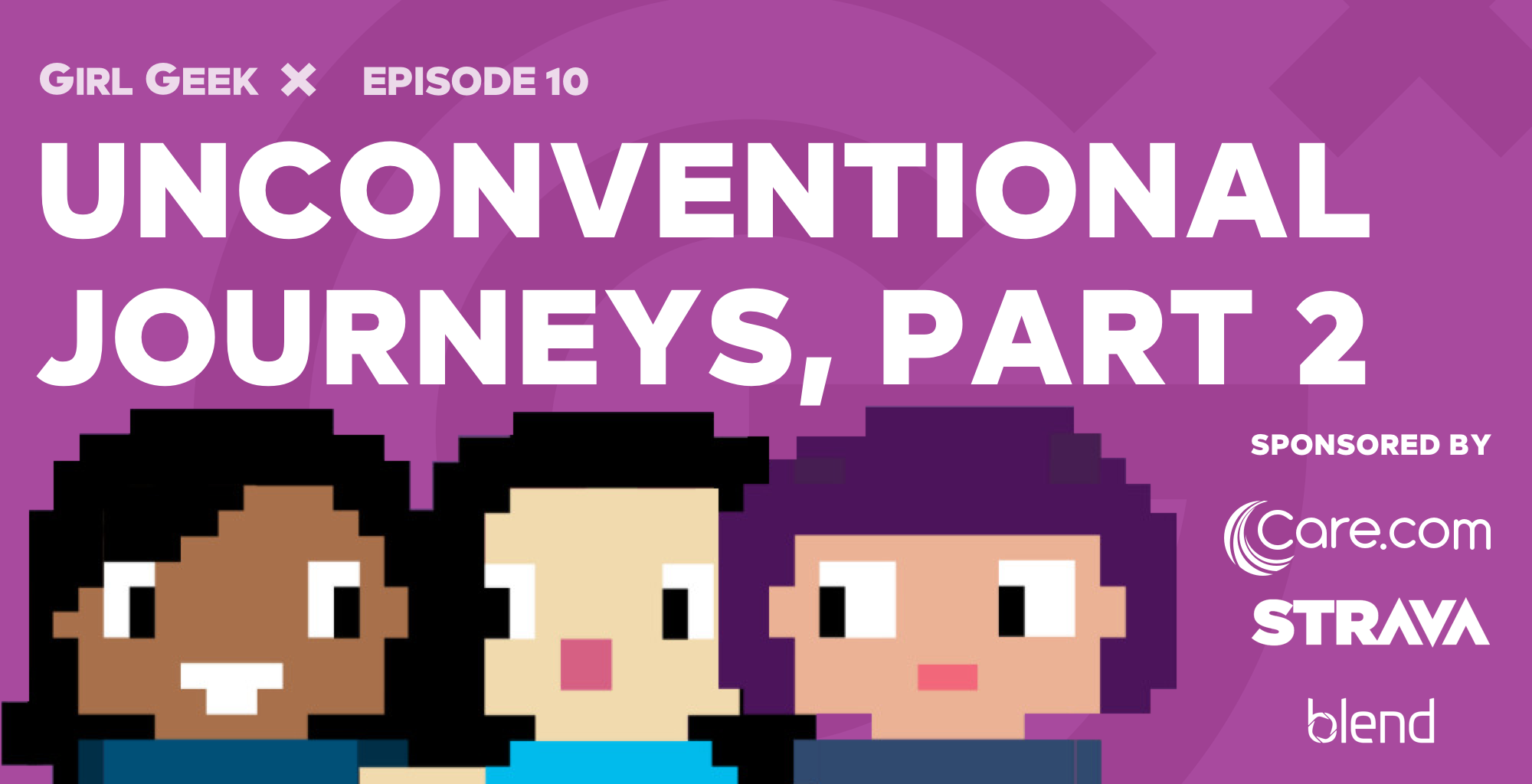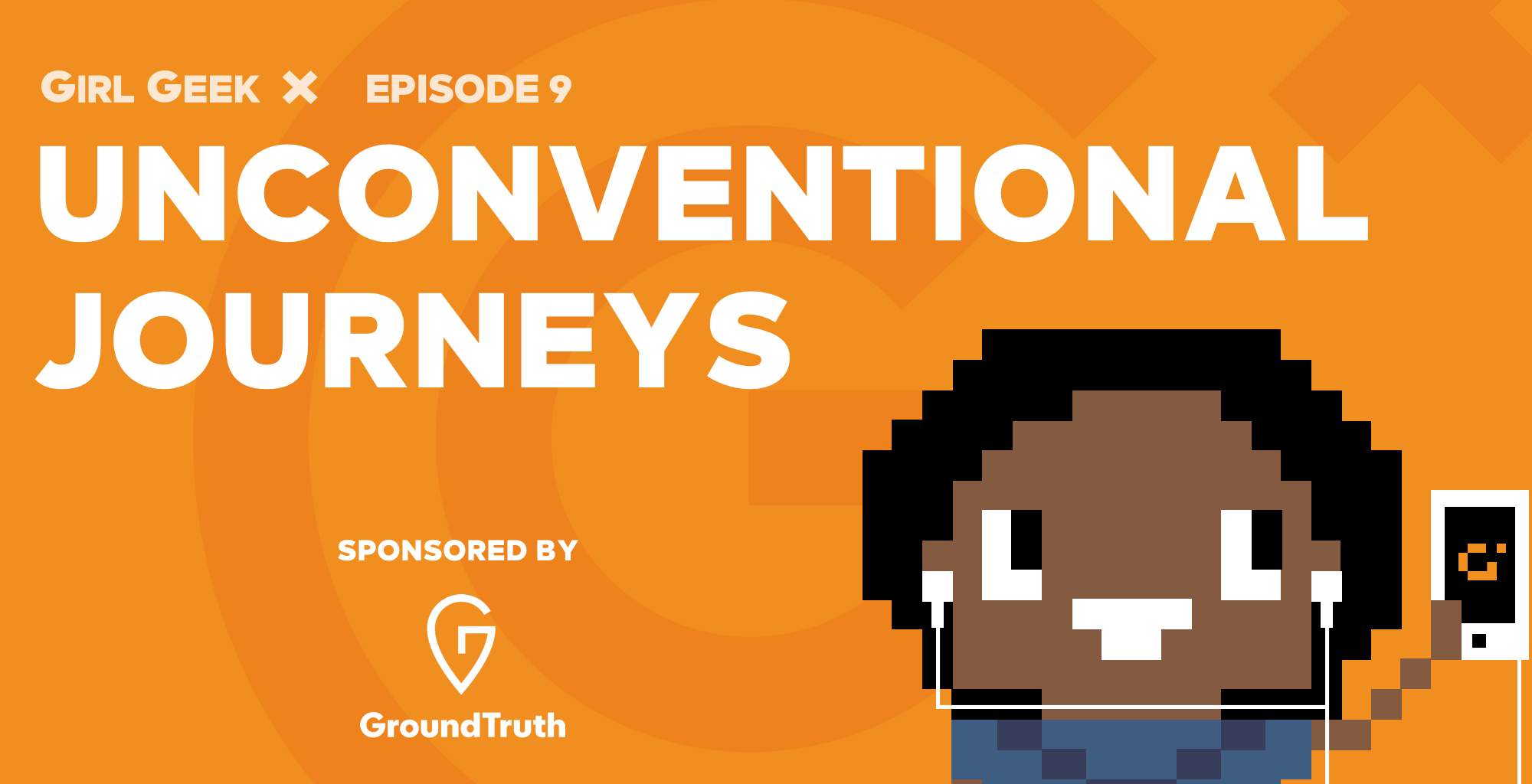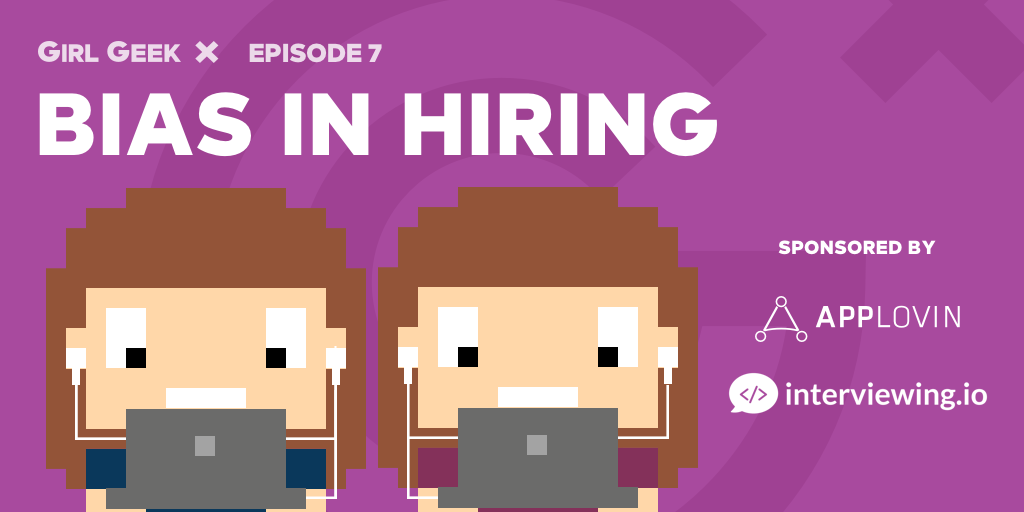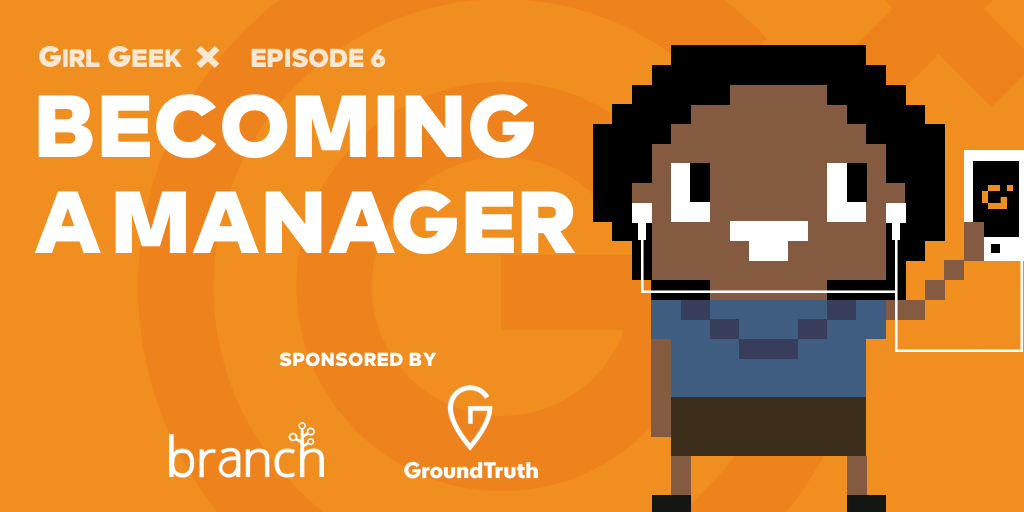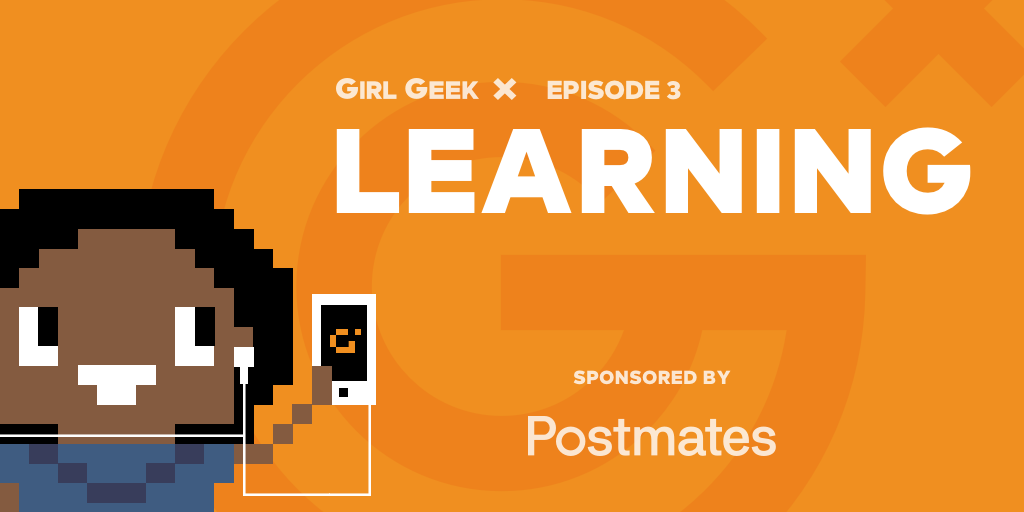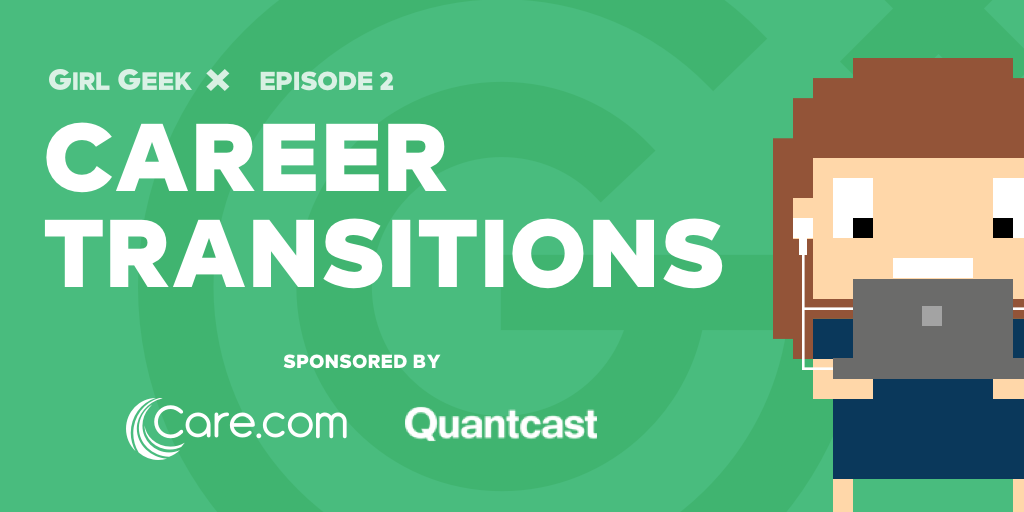Transcript:
Angie Chang: Welcome to Girl Geek X podcast, connecting you with insights from women in tech. This is Angie.
Sukrutha Bhadouria: This is Sukrutha.
Gretchen DeKnikker: I’m Gretchen.
Rachel Jones: I’m Rachel, the producer of this podcast, and we’re the team behind Girl Geek X. This podcast brings you the best of Girl Geek X events, dinners, and conferences, where we’ve been elevating women in tech, for over 10 years.
Angie Chang: Today we’re talking about personality, and how it shows up at work.
Rachel Jones: Is this something that’s come up at Girl Geek dinners? In questions in some way, or?
Angie Chang: I don’t think it really comes up in questions, but you can definitely tell that when a Girl Geek is speaking on stage, and, or off that they have their performance self, and then they have their authentic self.
Angie Chang: So, as an introvert, I’ve always enjoyed discovering who is also an introvert, and how they’ve managed to either shine on stage, shine in meetings, how they manage to speak up.
Sukrutha Bhadouria: I don’t think it’s been a discussion point, but we’ve definitely seen it.
Gretchen DeKnikker: I think as we go through this today, also thinking about that, there’s a difference between being an introvert, and being shy, or being uncomfortable, or sort of lacking confidence in one area. Right? Those are all not the same thing but, they sort of all get wrapped into one.
Gretchen DeKnikker: There are lots of introverts that aren’t shy, and there are lots of extroverted people who freak out at having to get up and speak in front of people, too. I always get annoyed, as an introvert also, that there’s this thing of, you’re shy, and so you’re not talking to me, or you lack confidence, and therefore, you’re being shy, and it’s like no, I’m just introvert. I find the discussions I’m having with myself in my head, way more fascinating than the discussion we’re about to have, and it doesn’t really have anything to do with being shy or anything else.
Rachel Jones: That’s something that I think is really interesting in this conversation. I think so often, personality isn’t even who you are. It’s who everyone else, decides that you are-
Gretchen DeKnikker: Mm-hmm (affirmative).
Rachel Jones: And it really affects the way that people treat you. So, as soon as they decide that you’re an introvert, then that totally affects the way that they’re interacting with you, and kind of affecting how they perceive your ability to change, or what you’re capable of doing.
Gretchen DeKnikker: Mm-hmm (affirmative).
Rachel Jones: Like, oh, this person is this type of way, so they won’t be able to do this, or they won’t be interested in that, or this is the reason why they’re acting this way. I think the labels that people put on each other around personality in the workplace can definitely have damaging effects.
Gretchen DeKnikker: Or that being an introvert is somehow some sort of disability. Like, oh, well you’re just gonna have to learn how to be an extrovert. It helps if you can play an extrovert on TV but, honestly introverts bring so much to the table, and should do so unapologetically.
Sukrutha Bhadouria: I think even the evolution when, Angie, you first started doing the intros, before a Girl Geek dinner, the talks would start, then when I started to join you, we were like so raw, and we were so awkward, and uncomfortable, and now we’re more confident.
Sukrutha Bhadouria: While I do think in a lot of ways I’m an extrovert, I’m very uncomfortable to the point when first started working, and you know you’re introduced to like Agile and Scrum, and you’re to give your update, and say what you had worked on the day before, and what you plan to do that day. I was so intimidated when I would have to give my update. Before, I would look down, and talk, and pretend I was looking at my notebook because I was so awkward.
Sukrutha Bhadouria: You know, I just decided there are things I need to do, and I forced myself. I need to know people at work. It’s really important to have those water cooler conversations, to get to know more people, and because I don’t feel comfortable talking right away, I ask a question, and they’re talking. So, that’s how I kick off a conversation. So, even though I’m shy when I first meet people, I found a work around, I guess.
Gretchen DeKnikker: I’m the opposite because I’m an introvert but, I spent my whole life doing dance, and singing, and acting, and so, I’m way more comfortable presenting in front of 100 people, than I am with three people I’ve never met, that I’m forced to have a conversation with. That’s terrifying to me, so I think it’s just sort of your comfort zone, right? What you’ve done previously that has helped you gain confidence to do it, right?
Gretchen DeKnikker: I think those smaller conversations are still, like, but now I think I can just say this is super uncomfortable, right? And bear with me, which I would never have done before. Angie, I feel like you have a lot to add on this because I feel like you are both shy, and introverted, and yet you’ve chosen this career path where you’re this role model, and sort of creating this whole environment for women, and you’re doing it all while you’re struggling with being shy.
Angie Chang: I like to think that the job found me [crosstalk 00:05:28]. I think most of what I actually do is, I’m more articulate writing. So I’ve done a lot of writing, and then when we do all the introductions at Girl Geek dinners, and having to give talks on diversity, and women in tech over the years. It’s really helped sharpen, and it’s definitely taken about 10 years to get to a place where I can actually just give talks now, rather easily but, it did take that decade of really grating through some pretty embarrassing experiences, to get to a place where I can now give a talk, and not think too much about it.
Gretchen DeKnikker: Is that your advice? That you just have to keep doing it until–
Angie Chang: You’ve just got to keep doing it for a long time, and I think I’ve definitely seen other people do this as well. Sometimes we see someone be super confident, and then we don’t really think about how long they’ve been doing this. If not in this particular job or industry, maybe they had 10 years of improv experience under their belt, and you just didn’t know it, and that’s why they’re so great with their gesticulations, or something.
Sukrutha Bhadouria: You know just the other day someone who’s really shy at work, told me that they wanted advice. They were talking about how they admire how I could just talk to anyone, and I’m like, “Listen, listen, this wasn’t always how it was.” I feel like I need to know everybody, like I said earlier, and I just force myself to talk to people.
Sukrutha Bhadouria: Now about what you just said, Angie, being able to give talks, something I struggle with myself. I was saying just giving an intro at a Girl Geek dinner, why I started to force us to do it, is because we needed to get better at it, and we did. I do think that obviously you got better at it faster than I did, but I had to, and everybody takes varying amount of time, but I had to really practice. I would initially write out what I planned to say, and researched the speakers, just in case I needed to say something about them, and I would come prepared. Same thing now, it’s so much easier for me to mentally prepare to give a talk, and I always say yes when I’m asked to speak. I just never say no.
Angie Chang: I like that, over preparing although you don’t have to, and that gives you an extra source of great things to say about people, and be great at giving talks.
Gretchen DeKnikker: [inaudible 00:07:57] quote from Disha Gosalia, who gave a talk at our Quantcast Girl Geek dinner, on how she navigated her career, as a shy engineer. It’s great. You guys should check it out. Now she was recently promoted to the VP of Service Operations and Support.
Disha Gosalia: Growing up in India, when you’re somebody who’s a straight A student, or academically focused, you’re kind of placed on a pedestal, and you always make your parents proud, and so it doesn’t matter if you’re a loner out there. I never realized that I was a shy, loner kid.
Disha Gosalia: So imagine my surprise when after I completed my software engineering degree in Computer Science, and went for my first job as a software engineer. In my first half yearly performance review, when your boss goes through all the great 10 things you did, but that one area of development that you always think about.
Disha Gosalia: He actually asked me, “So are you a little introverted? I never see you walking around the desks of your colleagues, or chatting up with them, and you actually don’t even talk much in team meetings.” And I’m like, “Am I supposed to talk much in team meetings? Well, I’m new. Should I not be listening more?” But, that was honestly the first time I realized that my personality did have a part to play in my career.
Disha Gosalia: Fast forward several years, now as I parent to fairly sensitive kids who are often called shy and quiet. I grapple with this thought on a daily basis. How do I raise confident young adults, who can accept themselves as what they are, but at the same time also has this growth mindset?
Sukrutha Bhadouria: I totally get that. I’ve struggled speaking up in meetings, even though I had a lot to say. I just realized that there were ways in which I could prepare myself to be able to speak. One is, of course, I would practice. You always know the content, or at least the goal of a meeting, before you go in. At least most of the times you know, so you can go in prepared with the points that you want to bring up. If someone else brings it up, that’s fine. You can add to it.
Sukrutha Bhadouria: So that sort of thing is really important for people to at least get a sense of what your opinion is. You can’t grow in any role without people really knowing what your opinion is, and whether or not you agree or disagree. You can’t always be silent. I don’t know if I would have given the feedback to her, the way her manager did, but I can totally see this feedback being necessary, and valid.
Angie Chang: When she was talking at the Girl Geek dinner, I was like, that is so me. I was called out, at least a few times, for being quiet in meetings. Then I’d actually actively have to work on being able to jump in and give an opinion or talk, give an update, make myself known in the room. So that’s definitely something to recognize, and overcome but it is definitely overcome-able.
Gretchen DeKnikker: I mean I think I come at it from, maybe the opposite angle, right? I have lots of opinions, as anyone who knows me will tell you. I think where I really struggled was, I’m a person who, I can live in this deeply analytical world, and I can live in this very, very creative world. That sometimes that allows me to see solutions, and patterns, and things that are really weird, and non-obvious. It took me probably until I was in my early 40s, to stop hiding that, or apologizing for it, or saying things like, “This might be really weird, but.”
Gretchen DeKnikker: Or I would spend days testing something out, to see if it would work before I would suggest it to anyone, and to really be like, “You know what? This is actually what makes me unique. This is the unique thing that I’m bringing to the table.” And to not be afraid to speak up in that way. To be like I know that my brain doesn’t work like, I think there’s some test out there. It’s like 90% of people don’t think that way, right?
Gretchen DeKnikker: So I was like, “Well, I’m awesome. You guys are so lucky to have me here, even if you think my ideas are crazy.” Right? And being okay with, it’s wrong. It’s okay if it doesn’t work out. It’s better to speak up. I don’t think you’ve told us, if you’re an introvert, or not.
Rachel Jones: True. I was thinking about that, when you were talking about what your introversion looks like, and how you are more comfortable presenting than talking with a room of three people. I was thinking, yeah, I’m more comfortable presenting to a room of 100 people than just mingling in a room of 100 people.
Gretchen DeKnikker: Right?
Rachel Jones: That’s the scariest thing-
Gretchen DeKnikker: Yeah.
Rachel Jones: To me but, I think one thing that was really interesting that stood out to me from Disha’s quote is how she said she didn’t realize that she was a shy, loner kid-
Gretchen DeKnikker: Yeah.
Rachel Jones: She didn’t realize until it was told to her, and when that feedback was given to her, it was really just behaviors that her boss was seeing, and not really who she was as a person. So I think thinking of personality as a fixed thing, versus things that you can learn, or things that you can challenge yourself to do. Yeah, I think that kind of complicates this question of personality, and how much it limits a person, or defines a person.
Sukrutha Bhadouria: I think as a manager, you need to be equipped to understand various personality types. You know the contradictions, where it feels like maybe not everybody knows it. So they don’t give the best feedback, and they don’t call attention to an area, along with what the benefits would be if they were to, sort of, acquire a different way of expressing themselves. If you don’t do that, it gets very confusing, and it feels very strange that you’re being told that you’re quiet, and that’s why that’s going to hinder your growth. That’s something that we need to be a little bit more sensitive about.
Sukrutha Bhadouria: I do want to say, though, there are certain tracks and career–study tracks–that you will find more introverts in because you know, especially when you’re a software engineer, a lot of what you do has to be a little bit more solo. You’re not working in a group. You’re not presenting as often as one would if you were in business school.
Sukrutha Bhadouria: There’s this quote I read somewhere that said, “If you’re looking for an introvert in business school, you’re not going to find one because even they know how to navigate the system, and come across like an extrovert.” So it’s not surprising to me that it took her that long to be told that she was shy because that’s just–the fact that she came from Computer Science, it’s not entirely surprising that it wasn’t called out earlier, or she didn’t draw attention to it earlier.
Angie Chang: I completely identify with being a shy, loner kid. I was that person in middle school, but I think that you have to know how you operate best, and even though I’m a shy introvert, I find one on one with people is really not intimidating. So it actually doesn’t bother me to go into a room and be like okay, I just need to talk to one person, and find that one friendly looking person to walk over to, and put my food down next to, and ask if that seat’s taken, or whatever, and just be like, “What are you doing here?” Making it more minimal to you, and not thinking about it as a room of 100 people. That’s also a handy tip from Girl Geek dinners, and having gone to many.
Sukrutha Bhadouria: Yeah, I watched you do that. Man, I would always be very awkward when people were in their own groups already, at a networking event, or even at a Girl Geek dinner. I remember you told me, like, walk over to who you want to talk to, and just look at them, and then they’ll automatically turn to you. Even if they’re talking amongst each other, then you can ask a question, or sneak in a word, or a sentence, and join the conversation. Even if after that you’re just listening, you’re joining the conversation.
Angie Chang: Yeah, I think we’re always feeling like we’re the most awkward person in a room but, I think that everyone feels like they’re awkward person in the room. So they’re usually happy, when you talk to them. They’re like, “Oh yes, I have someone to talk to now. They broke the ice.”
Sukrutha Bhadouria: Yeah, I think it’s been good, for me, to identify when I get uncomfortable, and when I do feel comfortable, and so in situations when I know I’m going to be uncomfortable, I bring whatever’s going to make me comfortable, so I’m my best self.
Gretchen DeKnikker: Jumping back what you guys were saying a little bit earlier, I’m curious–being told to speak up…. What advice would you give to the manager because that isn’t super helpful, right? But if you, like Sukrutha, you must have people on your team now, that are kind of shy. How do you manage that, and what advice would you give to managers?
Sukrutha Bhadouria: So first, I don’t think it’s been very helpful to tell someone, “Hey, you need to speak up more.” I think I need to be very, very aware of who has opinions, and who’s not speaking up because they’re just uncomfortable. I need to feel responsible, that I should draw them into the conversation. Once they started talking, they’re usually fine, and then slowly as time goes by, I need to be mindful to also draw attention to the fact that their thoughts were really, really helpful, and useful in the conversation, and then automatically they’re more comfortable bringing it up. I don’t know if pointing it out, and telling someone hey, you’re too quiet, just speak up, has ever been helpful, honestly.
Angie Chang: Right. That was great advice from the manager in the room [crosstalk 00:18:26].
Gretchen DeKnikker: I feel like if you’re giving that advice as a manager, like you need to speak up, then people are going to feel like, they need to add something just to say something, and then-
Sukrutha Bhadouria: Right.
Gretchen DeKnikker: How awkward, and detrimental is that, right? To just be saying anything to have your voice be heard in the room. That’s worse right?
Sukrutha Bhadouria: That is the worst because I do see a lot of women think that they just have to do that, and you hear them saying the most random things-
Gretchen DeKnikker: Right.
Sukrutha Bhadouria: But, you’re like you could not have thought that’s going to be useful in the conversation.
Gretchen DeKnikker: Yeah, but it’s the advice, that they’re, yeah-
Sukrutha Bhadouria: Yeah.
Gretchen DeKnikker: I think it’s more of a function of the advice, than anything.
Sukrutha Bhadouria: Totally, and that’s why it became more noticeable to me. There was mostly women doing that, and someone has told them, “Hey, you know you’re going to get overlooked, if you don’t say what you’re thinking.” You can’t always be thinking something useful, so you just say anything.
Sukrutha Bhadouria: So all of what we’ve been talking about, relates a lot to our quote from Product Design Lead, Eunice Noh. She shares a story of learning to speak up confidently, during our dinner with Blend.
Eunice Noh: Speaking up in meetings was really hard for me. There is an analogy I like to use. I’m not sure if everyone feels this way but, when I’m on a plane, in like the window seat. I think the entire time on the plane, wondering when am I going to use the bathroom. I’m like, “Okay I’m going to go now. Should I wake up my neighbor? Am I going to get stuck in front of the beverage cart?” By the time I convince myself that I’m ready to go to the bathroom, they’re like, “Seat belts, please.” And you gotta hold it for another 30 minutes, and it’s not a good feeling. It’s really not.
Eunice Noh: I think that’s similar in meetings, you know? I work myself in my head, and I’m trying to figure out exactly what I’m going to say, and making sure that what I say is not stupid. Should I talk now? Should I wait until the person’s finishes talking, and a million other questions in my head, and by the time I get the confidence to actually say something, the meeting has ended, and everyone’s already moving out of the room.
Eunice Noh: That’s, it’s very vulnerable. I was very, very, very vulnerable, and luckily, different from many of the past companies I’ve worked for. I had a great support system through my manager, and I had an outlet to talk to a lot of women during our Blend ladies’ night out.
Eunice Noh: So having people to help build that confidence, and give you those light nudges, and support from people around me. As a manager today, I strive to be like my manager, to give support, and help build confidence for every single person on my team. I’ve realized that building confidence, differs per person, that being thrown into the deep end, might not always be for everybody.
Rachel Jones: So it sounds like Eunice actually gives a lot of advice that was related to what Sukrutha said about how to tell someone they should speak up. How it’s more about building confidence, and knowing that not everyone will thrive if they’re just thrown straight in with knowing kind of, what approaches work for different people.
Angie Chang: What are your thoughts on this?
Sukrutha Bhadouria: I thought it was interesting that she called out that, at least at Blend, she was able to get a really good support system, through their Blend ladies’ night out, but maybe it can be a little bit more deliberate. Where you are trying to build your own support system, without waiting for your manager to set it up, or without your company’s ladies’ night.
Sukrutha Bhadouria: That will help build the confidence for you to then speak up at these meetings. Especially when you have something to say, that’s when you want to speak up. I like that she called that out, but you won’t always have those opportunities, where a manager’s helping us, or that we have a ladies’ night.
Gretchen DeKnikker: I think another thing that has happened to me in meetings, which is different from having a hard time speaking up, is having a hard time being heard. I’ve even tested this, because men will keep talking. If you go to say something at the same time, and they’ll keep talking, and so I’ve literally tested, if I keep talking, and they keep talking, will eventually they stop, and I’ve never talked long enough, that they’ll stop. That’s super frustrating.
Gretchen DeKnikker: This episode made me think about, there was this time, I’d been traveling a lot, we’d gone to the East Coast for a week, and then we’d literally flown on Friday night, and got there on Saturday, and then in Israel, the work week starts on Sunday. You’re on a weird time zone, or whatever. So, I was already extra cranky. Then we went in for a meeting, and this was my domain, and the two men in the room just kept talking, and I kept trying to add something. This was not their domain.
Gretchen DeKnikker: So, at some point, and this is not my finest moment, was I just got up, and I was like, “Well, it seems like you guys all have it figured out, I’m going to the hotel.” Up until very recently, I felt really bad about that, and I was forced to apologize to one of the people in the room, and I just thought about it recently. I was like, wait, hold on, and I felt embarrassed about that, and probably wouldn’t have shared it in this forum. Then I’m like wait a minute, no. That was a perfectly acceptable, I probably was not a nice as I could have been about it because I was tired, and I was so annoyed, but, at the same time, if you’re not going to let me speak, why am I in this room because I’d much rather be sleeping.
Angie Chang: I think that was radical candour, and that was a good job.
Gretchen DeKnikker: I want to go back, and be like, dude, I’m actually not–because I also felt like forcing someone to apologize to you, who obviously doesn’t want to apologize–
Rachel Jones: Like, what [crosstalk 00:24:17]-
Gretchen DeKnikker: Is also some ego driven nonsense, anyway.
Sukrutha Bhadouria: The danger, for me, when I was learning to speak up, is I started to talk over other people, though.
Gretchen DeKnikker: Mm-hmm (affirmative).
Sukrutha Bhadouria: That was something, and I still struggle with that, when I really rack my brain, that I want to say something, and I’m going to be heard, I tend to talk over people. I don’t want to be part of the problem.
Gretchen DeKnikker: When I feel myself very anxious, to speak, I think, “Why are you so anxious about this, why can’t you let that thought finish,” right? Most of the time it’s just like because I know what they’re saying is wrong, and I just want to be more efficient, or at least I think. Right [crosstalk 00:24:59]? Also, just let them finish their thought, but I think it’s different when you’re in this, when you’re having a conversation, and you’re interrupting people versus, it’s a room full of people, and everyone’s talking over everyone, and literally, you can’t be heard. Right?
Gretchen DeKnikker: I’ve raised my hand before, of just like, when you guys are done, and you want to stop talking all over each other, I will wait my turn, but if this is the only way that I’m ever going to be able to say anything, is if I just raise my hand. Which makes people laugh, and they think I’m a little bit weird, but I also get to speak at some point, without having to yell over the top of everybody.
Rachel Jones: I relate to that a lot, and I definitely relate to Eunice’s quote also because I’m definitely the person–My statement has to be completely perfect, before it can leave my mouth, and enter a room. So, I will spend so much time, just analyzing, reanalyzing the thing that I’m about to say, and then yeah, usually by the time I’m ready to say it, then we’re off that topic, or the conversation’s over, or the meeting is over. Yeah.
Rachel Jones: I’ve just really envied people who feel free to just say whatever, whether it’s valuable, or not.
Gretchen DeKnikker: The people who are willing to say their thought process out loud. The speak, then think versus the think then speak.
Rachel Jones: And then ponder over it, for the night, and then come up with the perfect thing to say, and be able to say it to no one.
Angie Chang: Bring it up in the hallway the next day, in a smart email.
Sukrutha Bhadouria: So, someone told me this, which I’ve never been able to do it, but they said, in a meeting, if someone, or whatever, in a casual conversation, too. Someone is saying something that you don’t like, and you already know that, they’re saying something that’s not right, you have to say, in order for it to not turn into a back and forth. You have to say something like, tell me more, and that’ll give you more of a chance to compose yourself and find the right words to put it back on them, and find the right ways to disagree, in a very civil way. I’ve never been able to do it, though. Once I do try it, I’ll let you know if it works.
Gretchen DeKnikker: In my better moments I do, but it’s mostly like, okay. It literally, tell me more about this ridiculous thing [crosstalk 00:27:19], that seems to have come out of your mouth, but that’s also me, stopping myself from saying something ridiculous that’s not helpful.
Sukrutha Bhadouria: Right. Right, I think that’s what I want to do because I sometimes just react. Not sometimes, a lot of times.
Rachel Jones: Is it the same for you, at work, and outside of work?
Sukrutha Bhadouria: As I work with the same set of people a long time, yeah, then this–the layers shed, and I end up reacting the same way, I suppose. Some of my peers I’m working with right now, I’ve worked with for three years. So, I’m starting to be less polite when someone says something awful, or does something that’s not cool. When I see in our peer group, a guy cutting someone else off, then I’m the first one to react, unfortunately. Whether it’s in my head, or verbally, I’m probably the first one to react.
Angie Chang: That’s not unfortunate.
Gretchen DeKnikker: Yeah.
Sukrutha Bhadouria: There are various ways to shut down conversations, and there are more constructive ways to make the person who is being foolish, very obviously foolish to everyone else but, if I join in that, and I play in the mud with them, then-
Gretchen DeKnikker: Right. [crosstalk 00:28:48]
Sukrutha Bhadouria: I look as foolish-
Gretchen DeKnikker: Right.
Sukrutha Bhadouria: That’s what I don’t want.
Gretchen DeKnikker: I think as I get older, it’s more of the same person. Right? I think, I didn’t bring a lot of my personality, my fun side, to work, for a really long time. Now I think, I spent so many years, at very early stage startups that now I think, me at work is more intense, and I have to pare that back because I’m so used to working on these crazy deadlines, and whatever, that I get overly aggressive about things that aren’t that big of a deal, but I just have to uncondition myself because I’m not that way with my friends. It’s like it’s gone in this further direction, the opposite way, as I’ve gotten older.
Angie Chang: I find work personalities, and every day personalities, that’s something that I’m kind of working on. Sometimes it’s intimidating to go to an office and hear everyone chatting around the water cooler, talking about things, often times pop culture, which I’m really bad at. I’m trying to find something to say, but I’ve nothing to say, nothing to say about sports, and I know if I want to talk about something that excites me, it’s the death app, of five inspirational quotes of the week, and I’m like great, I’m going to talk about death now. So, I think it’s–
Gretchen DeKnikker: And if you’re not understanding her, yes she said death app, like dying people app, yes–
Angie Chang: Yes, like a goth. So, I think it’s definitely some part of me is like how do I be one of the cool kids, and have this great conversation [inaudible 00:30:28] off the bat, about the very topical things. I think it’s just a matter of really making the points when they’re needed, and being memorable with them, instead of just the everyday chatter. The [inaudible 00:30:40] everyday chatter is helpful in greasing the wheels, to get what you want at work.
Gretchen DeKnikker: I think it’s just finding, points of commonality, and as you get older, and you get more comfortable with who you are, and you bring more and more of that to work, then I think you sort of find those different connections with different people, and I’m sure that not everyone wants to talk about the Kardashians all the time, Angie–
Angie Chang: Thank the Lord.
Gretchen DeKnikker: Just Sukrutha and I.
Sukrutha Bhadouria: Well, there’s so much to talk about. I’m kidding.
Gretchen DeKnikker: So, youngster.
Rachel Jones: Yeah.
Gretchen DeKnikker: What do you bring to work?
Rachel Jones: Well, thinking about this, I think a lot about just different work contexts, only giving you so much space to be your authentic self.
Gretchen DeKnikker: Mm-hmm (affirmative).
Rachel Jones: So, I was working with high schoolers for a few years, and the version of myself that I had to be, in order to do that job, was so different from my natural self. There were so many parts of me that I couldn’t reveal, so many things that I had to force myself into, like being more authoritative, and speaking more strongly.
Rachel Jones: It’s definitely nice to be able to feel like you can be fully yourself at work, but I think a lot of spaces are not designed for that, and I think even, just as a woman, and as a woman of color, thinking about how office culture in general, just puts a lot of limits on those kinds of expression.
Rachel Jones: I think the question of bringing your full self to work isn’t always just about your own comfort, or the extent to which you know yourself. It is a lot about the environments that you’re in, and you can definitely work to challenge that, or work to really just show up, regardless of the space that you’re existing in, but it definitely has varying levels of success with people in different situations.
Gretchen DeKnikker: Yeah. That makes me think of 22 years ago, when I started in tech, and how you’re just trying to be in the room, and not remind them that you’re a woman, and how much anonymity I started over the years, and now it’s not just, oh I can let them know I’m a girl sometimes. It’s like yeah, I’m a girl, and what? That’s my superpower, what do you have? Right. I think that the industry has evolved, right? That’s nothing that I changed personally. That’s just sort of, how things have gone.
Angie Chang: I want to see it on our shirt. Girl Geek X, that’s my superpower.
Angie Chang: This ties in well with our quote from Sandra Lopez. She brought up a great point about personality while sharing some advice for her younger self during our Elevate Conference this year. Sandra Lopez is a VP at Intel Sports.
Sandra Lopez: I joined Intel 2005. 2006 I had a meeting with an individual by the name of Early Felix, and Early Felix was pulling together executive leaders that happen to be Latinos, and he asked me a question. He asked me this, what does it feel like to be a corporate Latina? A Latina working in corporate America. I was just like, what are you talking about? I was asking what are you talking about because I never made my ethnicity, or my gender, an issue. Yet it was bothering me because I couldn’t answer the question. So each day would go by, I would take showers, I would think about it.
Sandra Lopez: Several months later I was in the shower, and I realized something. I realized that I was just never myself, and so, in the spirit, I wanted to discover who I was. I began to shed the skin that society influenced me to wear, such as the pant suit, and I began to be more familiar with who I was. Who Sandra Lopez was, in her own skin. Five feet, two inches tall. I was destined to wear feminine clothes. I wanted to wear those red suede pump shoes that you see on the PowerPoint, with three inch stilettos. I wanted to wear dresses that would accentuate my Latina curves, because that would be my ability to embrace my unapologetic self.
Sandra Lopez: If I were to advise my younger self, and do it all over again, is to be your unapologetic you, and I say that because in the process of understanding who you are, and what makes you special, you’ll discover your own depth, and what you’re capable of. You get confidence, you’ll know your place in society, in this world, and because I discovered who I was, over 10 years ago, arguably my career started to succeed.
Gretchen DeKnikker: Can I first just say, I love her so much. It’s just, we just need so many women like her to stand up and just say, these are all of the things that make me, me, and I’m going to bring them in with me, and I think it’s different for everybody, right? Figuring out who that is, and who you are, and then not feeling bad about it, anymore.
Angie Chang: I guess, after listening to Sandra, I feel inspired to think about what I do want to talk about at the water cooler, and bring myself to work in a way that works, and also less, I think Sukrutha said, to not force myself to open my mouth in a meeting, when there’s nothing particular to say.
Sukrutha Bhadouria: I think it was when Microsoft sponsored a Girl Geek dinner, one of the speakers said that, instead of working on your weaknesses, you should work on your strengths. So, when I listen to Sandra, I thought about that because she decided to just embrace who she was, and continue on, and that’s when she ended up seeing her career really start to succeed. I find that for myself too.
Sukrutha Bhadouria: Luckily we work in an environment now where people just dress any way they want, and when they’re in tech, but I’m sure at that time, for her, it must have been really, really hard, to be herself. So, yeah, more power to you if you want to wear something different, or whatever makes you comfortable.
Angie Chang: When my sister got tattoos, mom was like, “You’ll never work in an industry”, and we’re like wait a second. Now, I think tattoos are everywhere. Having hair that’s a different color than the one you were born with, is completely natural, all these things–
Gretchen DeKnikker: I hope so, my hair grows purple.
Angie Chang: Right, and all these things, all these ways we differentiate ourselves, and we celebrate our differences, has made us a more interesting workplace, and industry.
Sukrutha Bhadouria: Yeah, you need all sorts of perspectives, make a good product.
Angie Chang: All different personalities. Yeah.
Gretchen DeKnikker: Yeah, I think that’s what attracted me to tech, right? Because I am very rough around the edges, and I could figure out how to get along, and be more polished, and whatever, but instead, I found a place that would take me as is. I don’t go into big corporate environments where I would be just, pretending to be somebody else, in my ways, I stick to smaller, scrappier environments, where a personality like mine works, and so, it’s sort of, rather than trying to change me, I just kept trying out different environments, until I found one where I could just be myself.
Rachel Jones: I think that’s an interesting way to think about it. I really like that Sandra uses the word unapologetic.
Gretchen DeKnikker: Mm-hmm (affirmative).
Rachel Jones: Because to me, that really sounds like I’m going to show up, regardless of [crosstalk 00:38:33] how well my personality fits into this space, or how anyone feels, or how much space they’re leaving for me, to do this. So, it’s interesting just thinking about that perspective, versus I’m going to find a place that actually supports my personality.
Gretchen DeKnikker: Mm-hmm (affirmative).
Rachel Jones: I think, yeah, they’re both definitely valuable, and I think, yeah, it would work differently for different people, but it’s really interesting hearing both perspectives.
Gretchen DeKnikker: The thing that is sort of counterintuitive about it, is that you think if you are bringing more of yourself, that you’re being more vulnerable, and people are going to judge, and reject that. Actually what I found, and what I think Sandra found, is that people really embrace that because there’s something very genuine about it, and they know what they’re getting with you, and love me, or hate me. There’s not much mystery to what a daily interaction with me is going to be like, right. I think that people appreciate that, they just appreciate transparency.
Rachel Jones: I like thinking about this, discovering your authentic self, and bringing your authentic self being kind of a key to unlocking success in your career.
Gretchen DeKnikker: And understanding that it’s a work in progress. Right. You’re not one day just going to wake up, and be like, “Oh, I know exactly who I am now”, right? I feel like I’ve made this analogy that you’re like a jigsaw puzzle, and so I thought, around the time I turn 40, which is also around the time I became a venture-backed founder, that not all the pieces fit together perfectly, but that I had a pretty good picture of who I was.
Gretchen DeKnikker: Then as a founder, I was just put in these situations, and this intensity, that I’d never experienced, and I felt like I was suddenly handed new puzzle pieces, and that it wasn’t just, oh, I have to figure out where this goes. It’s like I almost have to reshape this whole thing, to figure out, because there’s essentially extra pieces, that’s all. You get more confident, and more comfortable, but you’re always going.
Angie Chang: When we think about people, and their authentic selves, I am always grateful for those people who came to their authentic self, and do things like quit working in finance, and now open a bakery. That’s super popular in San Francisco.
Angie Chang: Recently I’ve been constantly inspired by Brit Marling’s work. She turned down a job at Goldman Sachs to make films, and pursue her love for writing and directing and acting. So, I look at, not just people being an authentic self to be an executive, but also just be good at a craft, or good at their technical self. Obviously I’m a huge fan of The OA right now.
Angie Chang: Thanks for listening to this episode of the Girl Geek X podcast. We’ll be back soon with more advice from women in tech.
Rachel Jones: This podcast is produced by me, Rachel Jones, with recording help from Eric Brown. To learn more about Girl Geek X, or buy tickets to our next dinner, visit GirlGeek.io. You can also find videos and transcripts from our events. If you’re interested in hosting a Girl Geek dinner, email Sponsors@GirlGeek.io.
Angie Chang: This podcast was sponsored by Quantcast, a global leader in artificial intelligence technology. Quantcast is using machine learning to drive human learning, to help brands grow in the AI era.
Angie Chang: This podcast is sponsored by Blend, a Silicon Valley technology company, propelling the $40 trillion consumer lending industry into the digital age, through partnerships with banks, lenders, and other technology providers.


